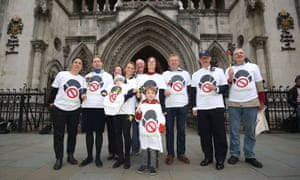The government’s new plan to tackle the UK’s toxic air crisis does not commit to a scrappage scheme for dirty diesel cars and places the largest burden for solving the problem on to local authorities.
These could impose charges on older diesel cars to keep them out of polluted areas, but the government said other measures should be considered first.
Ministers were forced to act after a series of humiliating defeats in the courts, which ruled earlier plans illegal. ClientEarth, the environmental law firm which sued the government, is now examining the new proposals and could go back to court again if it decides the measures will not reduce illegal levels of air pollution in the “shortest possible time”, as the law demands.
Levels of nitrogen dioxide, emitted mostly by diesel vehicles, have been above legal limits in almost 90% of urban areas in the UK since 2010. The fumes are estimated to cause 23,500 early deaths a year and the problem was declared a public health emergency by a cross-party committee of MPs in April 2016.
The government first lost to ClientEarth over the adequacy of its strategy in April 2015 and was ordered to come up with a new plan. The release of these proposals was buried on the September Saturday in 2015 when Jeremy Corbyn was first elected Labour leader, while the final plan was published on “take out the trash day” in December that year, along with dozens of other ministerial statements and many hundreds of government documents.
However, the plan included just six clean air zones (CAZs) – Birmingham, Leeds, Nottingham, Derby, Southampton and London – where some polluting diesel vehicles would be charged to enter city centres. ClientEarth, believing this to be inadequate, went back to court and won again in November 2016.
Court documents revealed that the Treasury, then run by George Osborne, had blocked proposals from other government departments for 16 CAZs in towns and cities blighted by air pollution, due to concern about the political impact of angering motorists. Both the environment and transport departments also recommended changes to vehicle excise duty to encourage the purchase of low-pollution vehicles. But the Treasury also rejected that idea, along with a scrappage scheme for older diesels.
The government continued to delay action, asking the court for 10 months to develop another new strategy, but lost again, with the judge ordering a new draft plan by 24 April and a final plan by 31 July.
However, ministers then argued that the tradition of “purdah” before elections, when no official announcements are made, should allow the postponement of the strategy until after the general election on 8 June. This was again rejected, with Mr Justice Garnham saying: “The continued failure of the government to comply with directives and regulations constitutes a significant threat to public health.”
Conservative ministers have sought to blame previous Labour governments for giving tax breaks for diesel cars, which produce less climate-warming carbon dioxide. But experts say all governments since the 1990s have done this.
Furthermore, government officials at the time were aware that diesel cars produce high levels of NO2 but they expected tightening EU emissions regulations to curb the problem.
However, car manufacturers found ways to circumvent the rules and across the industry produced vehicles that emit far more NO2 on the road than in the official lab-based tests. Transport campaigners argue that, as in Germany and France, car makers should be forced to pay for upgrades to their vehicles to cut pollution.
“The real villains here are the car companies who cheated tests, and lied to everyone about the pollution coming from their diesel vehicles,” said Greenpeace’s Areeba Hamid. “Drivers are right to feel conned, but what we can’t do is carry on letting these dodgy diesel cars pollute our towns and cities with toxic air.”
Government fails to commit to diesel scrappage scheme in UK clean air plan
